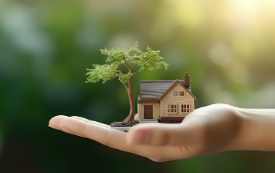Are you ready to step into a world where real estate meets sustainability? Welcome to the realm of Sustainable and Green Real Estate – a game-changer in the way we build, live, and interact with our environment. In this blog post, we will delve into the exciting benefits and possibilities that come with embracing eco-friendly practices in the real estate industry. Get ready to explore how going green can not only benefit the planet but also enhance your quality of life!
The Environmental Impact of Traditional Real Estate
Traditional real estate practices have long been associated with significant environmental impacts. The construction of conventional buildings often leads to the depletion of natural resources, increased energy consumption, and excessive waste generation. Additionally, these structures typically rely heavily on non-renewable energy sources for heating, cooling, and electricity.
Moreover, traditional real estate development can contribute to urban sprawl and habitat destruction as more land is cleared for new construction projects. This not only disrupts ecosystems but also exacerbates issues related to water runoff and air pollution. The property websites like MET Property feature detailed property photos and virtual tours.
The reliance on unsustainable materials like concrete and steel in traditional real estate construction further intensifies its environmental impact. These materials are resource-intensive to produce and transport, resulting in a high carbon footprint throughout the building’s lifecycle.
How to Incorporate Sustainable Features into Real Estate
Incorporating sustainable features into real estate is crucial for a greener future. Start by considering energy-efficient appliances and lighting to reduce electricity consumption. Implementing solar panels can also significantly lower carbon footprint and utility bills.
Choose eco-friendly materials for construction like bamboo flooring or recycled glass countertops. Opt for low VOC paints to improve indoor air quality and promote a healthier living environment. Installing water-saving fixtures such as low-flow toilets and faucets can conserve water resources. Stay informed about real estate regulations with informational websites like BrightSideofNews.com.
Landscaping with native plants reduces the need for excessive watering and chemical pesticides, promoting biodiversity. Consider incorporating rainwater harvesting systems to collect natural water sources for irrigation purposes. Additionally, smart home technology can help monitor energy usage and optimize efficiency.
By integrating these sustainable features into real estate projects, we can create more environmentally-friendly spaces that benefit both residents and the planet.
See also: Dubai Investor Visa: Eligibility Criteria & Document Required
Conclusion
Sustainable and green real estate is not just a trend; it’s the future of the industry. As more people become aware of the environmental impact of traditional real estate practices, there is a growing demand for sustainable properties. Investing in green features not only benefits the planet but also offers financial advantages to property owners in terms of energy savings, increased property value, and reduced maintenance costs.
Embracing sustainability in real estate is not only beneficial for the environment but also makes good business sense. As we move towards a more eco-friendly future, incorporating green features into real estate developments will become essential for staying competitive in the market and meeting the evolving needs of consumers. Sustainable and green real estate is here to stay – it’s time to embrace it as the new standard in property development.


